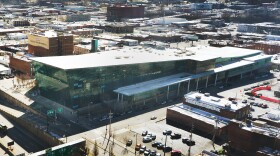-
Introduced by Republican state Rep. Wendy Hausman, “The Taylor Swift Act,” would offer a path for Missourians to sue when someone has distributed or published an AI-generated sexual image of them without their written consent.
-
A data center in the Crossroads is using the clean energy loan for its chilling equipment. Supporters hope that the loans will encourage the projects to be more environmentally friendly. Critics want the city to do more to regulate the developments.
-
The executive order is the latest in a series of attempts by the Trump administration to hold back state-level AI rules. Experts say it's not legal, and many Republicans, including Missouri Sen. Josh Hawley, are also uncomfortable with the effort.
-
Medical providers started using Ambient Assist by NextGen Healthcare this year at Samuel U. Rodgers Health Center. The tool, which transcribes and summarizes an appointment’s conversation, lets providers see more patients and be more present without being overwhelmed with post-appointment paperwork.
-
Propel makes a free app for people on food stamps. Led by Jimmy Chen, who grew up living with food insecurity in Kansas City, Propel is now giving some of its users $50 each to help offset the government's delayed SNAP payments.
-
More than 40,000 workers in Kansas City work in the 10 largest occupations most susceptible to AI automation — especially customer service and white-collar jobs.
-
Olympic gold medalist Katie Ledecky ditched her swimming cap for a lab coat to teach USD 232 students about careers in science, technology, engineering, art and math, or STEAM.
-
Scientists and seed companies are working on shrinking corn. The subtle difference in height has led to some big changes in how shorter corn can be planted and managed in the Corn Belt.
-
At Dozer, kids put down the screens to play in the sand. A Children’s Mercy pediatrician says it is one way to restore family connection amid "technoference."
-
Local leaders are addressing AI’s impact on water, surveillance, transparency and more. A mostly hands-off approach at the federal level means regulating complex AI issues is–so far–evolving in a patchwork of laws.
-
The Republican senator from Missouri is teaming up with Democratic Sen. Richard Blumenthal on legislation aimed at deterring tech companies from training artificial intelligence models on content they didn't receive permission to use.
-
Missouri state Reps. Marty Joe Murray and Colin Wellenkamp are part of the bipartisan "Missouri Future Caucus," which is looking into bills about the proliferation of artificial intelligence and disaster preparedness.
Play Live Radio
Next Up:
0:00
0:00
Available On Air Stations












